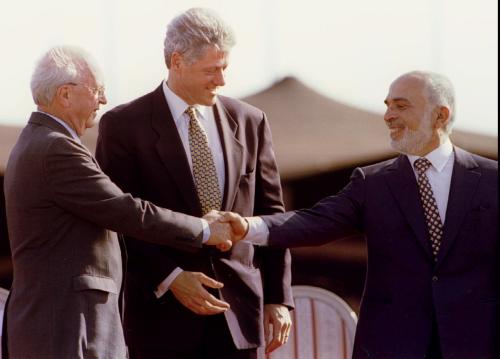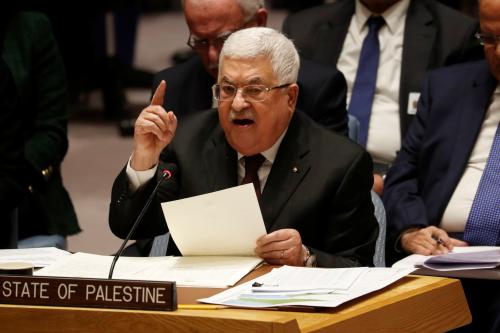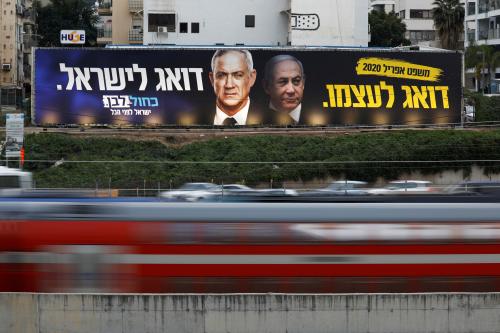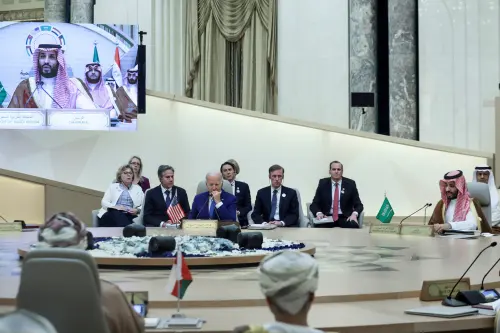Jordan’s King Abdullah is facing what may well prove to be the most consequential decision of his 22 years on the throne: how to respond to an Israeli annexation of the occupied Jordan Valley. He will face enormous pressure from the Jordanian public to firmly oppose Israeli action, but he has to contend with the Trump administration’s enthusiasm for annexation and its tepid support for him.
Jordanians and Palestinians believe annexation will shut the door permanently on a viable future Palestinian state, effectively the end of the dream of a two-state solution to close decades of conflict. Trump’s so-called “deal of the century” has been firmly rejected by King Abdullah and his nation. The king was largely ignored in its formulation — unfortunately, an all-too-familiar norm for Americans developing peace plans for the conflict.
There is no consensus in the Jordanian establishment about how to respond to annexation. One school advocates abrogating the 1994 peace treaty with Israel completely. One supporter of the idea, a former Royal Jordanian Air Force general, argues that “Jordan has no option except to abrogate the peace treaty (which) will mean the cancellation of security, military and economic agreements as well.”
Some are especially eager to dump a $10 billion natural gas deal with Israel, which has never been popular. If annexation goes forward, there will be a clamoring to abrogate the gas deal. The parliament has already voted to annul the deal; the courts have ruled that it lacks the legal authority to do so. But Jordan benefits from the gas deal more than Israel, which the king knows well. Ditching the gas deal would hurt Jordan and be difficult to replace.
Others support a more symbolic step, like withdrawing the Jordanian ambassador from Tel Aviv or taking other steps to downgrade diplomatic relations, but not cut them completely. This has been done before in other crisis in the relationship, and would be seen as more of the same.
Still another line of thinking has supported a strenuous diplomatic response intended to rally opposition to annexation across the Islamic world, Europe, and elsewhere. In the U.S., Jordan would seek congressional opposition to annexation on both sides of the aisle. Of course, the Trump administration will veto any serious condemnation of annexation in Congress or in the United Nations Security Council. Diplomacy is time-consuming and lacks a dramatic riposte to annexation.
The COVID-19 pandemic complicates Amman’s options. The king took swift action to lock down the country and close its borders. But tourism has dried up, costing the weak economy dearly. Remittances from Jordanian workers in the Gulf states are down too. Jordan cannot risk jeopardizing foreign aid in the midst of the pandemic and the associated economic crisis. Amman received $1.3 billion in aid from the U.S. in 2019.
The king has been clear in public. He told the German publication Der Spiegel last month that “if Israel really annexes the West Bank in July, it would lead to a massive conflict with the Hashemite Kingdom of Jordan.” He pointedly did not say that abrogation of the peace treaty was off the table as an option. Rather, he said that he was studying “all options.”
The king has refused to take phone calls from Prime Minister Benjamin Netanyahu or meet with him in recent years. He rebuffed a meeting request last August. Like his father Hussein, Abdullah believes that Bibi is untrustworthy.
One way for Jordan to signal that Israel should not annex the valley would be in security cooperation. For decades, the two countries’ intelligence agencies have been close partners in counterterrorism. This connection has generally been immune to political issues, even surviving the botched assassination attempt Netanyahu ordered in downtown Amman in 1997 of a Hamas leader. Drastically cutting down on the covert connection will have impact. But of course by definition, cutting the clandestine relationship is not public, which leaves Abdullah still in need of a dramatic response.
If the Palestinians carry through on their warning that they will cut security ties with Israel if annexation proceeds, that will place more pressure on Jordan to do the same. The Jordanians do not want to be perceived as collaborators in the occupation of Palestinians.
The peace treaty never really recovered from the assassination attempt in 1997. It turned cold as a result of Bibi’s recklessness. Last year, Jordan did nothing to celebrate the 25th anniversary. It is universally unpopular with Jordanians, as polls have shown for years. Its termination would be hailed in the street.
I have known King Abdullah since 1995, when he was the commander of Jordan’s elite Special Forces and never anticipated becoming king one day. In his 22 years at the helm, he has steered Jordan very carefully. He thought George W. Bush’s Iraq war was a terrible mistake, but he was discreet about his criticisms. He did not let his doubts about the war poison his relationship with Washington like his father’s did in 1990 over the Kuwaiti crisis. He has been astonished by President Trump’s reckless behavior toward the Palestinians, but again he is cautious in his remarks.
He has also learned that resolute action will be rewarded. The king has fought against al-Qaida and ISIS with skill and intelligence. He will act in July, regarding the annexation issue, if pushed into a corner. It will be a tragedy if annexation undoes one of only two peace treaties between Israel and its neighbors. That will indeed be a deal for the century — a remarkably bad one.








Commentary
With Israel’s annexation plans looming, an hour of decision for Jordan’s Hashemites
June 1, 2020